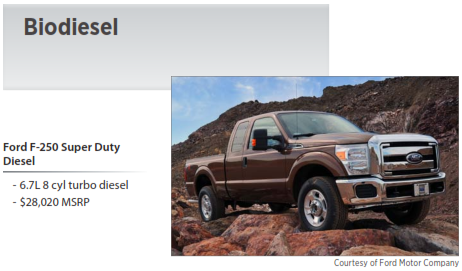
Biodiesel is a clean, renewable fuel produced from a wide range of vegetable oils and animal fats. B100 is pure biodiesel, but consumers typically buy biodiesel blends ranging from B5 (5% biodiesel, 95% petroleum diesel) to B20 (20% biodiesel, 80% petroleum diesel). B20 has been shown to perform well in diesel vehicles, even in cold weather and in older engines.
Vehicles currently approved by their manufacturers for B20 fuel include:
-
Chevrolet Silverado 2500 HD and 3500 HD
-
GMC Sierra 2500HD and 3500HD
-
Ford F-Series Super Duty Diesel Pickup
-
RAM 3500 with B20 package for fleet customers.
Biodiesel fueling locations offering blends of B20 and above are available online at www.afdc.energy.gov/afdc/locator/stations/ or on your mobile device at www.afdc.energy.gov/stations/m.
Biodiesel is different from plain vegetable oil.
Biodiesel is a biodegradable, renewable fuel made from vegetable oils or animal fats that are filtered and processed to remove water and contaminants. They are then mixed with alcohol and a catalyst to produce biodiesel. B100 must be produced to strict specifications (ASTM D6751) to ensure proper performance of any blend level. The chemical properties of unprocessed vegetable oil differ from biodiesel, and engine manufacturers do not recommend the use of raw vegetable oil in diesel engines.
Biodiesel is good for your vehicle and the environment.
Biodiesel helps lubricate and reduce wear on moving parts. The use of biodiesel blends can reduce tailpipe emissions, such as particulate matter (PM or soot) and hydrocarbons (HC), as compared to diesel. Biodiesel derived from soybeans also reduces overall lifecycle emissions of carbon dioxide by more than half relative to conventional diesel.






